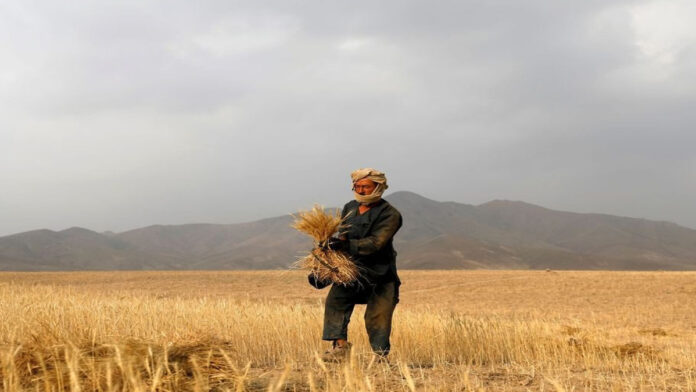ISLAMABAD: The government on Thursday reversed its decision to donate 50,000 tons of wheat to Afghanistan and also rejected a proposal to fix wheat procurement price at Rs2,200 per 40 kg for the new crop.
The Economic Coordination Committee (ECC) of the cabinet deferred a proposal to give the nod to a Ramazan relief package to the tune of Rs8.3 billion.
However, it decided to procure 300,000 tons of sugar from the millers amid a bumper crop.
The move will benefit the millers, who have again managed to sell their surplus stocks to the government instead of competing in the market and lowering prices.
A statement issued by the finance ministry read that the national food security and research ministry had presented a summary for withdrawal of its earlier summary for supplying 50,000 tons of wheat to Afghanistan.
Read also : Microsoft’s new update Will Make Everyone an MS Excel Expert
“The ECC allowed the withdrawal of [the] earlier summary for 50,000 tons and granted permission for [the] already provided 6,627 tons of wheat worth Rs670 million to Afghanistan,” it added.
The ECC made the decision on the instructions of Prime Minister Imran Khan, who had made up his mind 10 days ago to reverse the move.
Pakistan withdrew its humanitarian aid at a time when India has started delivering 50,000 tons of wheat to Afghanistan.
The government had decided on February 14 that instead of providing Rs2.5 billion worth of wheat to Afghanistan, it would repurpose the money, according to the national food security ministry.
The finance ministry further stated that the ECC had assigned Pakistan Agriculture Storage and Services Corporation (Passco) the target of procuring 1.2 million tons of wheat with a cash credit limit of Rs65 billion at Rs1,950 per 40 kg.
However, the ECC refused to increase the wheat support price to Rs2,200 per 40 kg – 13% higher than the last season’s rate.
The committee rejected the proposal despite Passco telling the government that it was unable to procure wheat at the current prices due to higher rates in Sindh and Balochistan.
The ECC was of the view that PM Imran had already refused to increase the price and the food ministry should not have brought the proposal to the forum.
The committee was informed that the Pakistan Bureau of Statistics (PBS) had reported the average wheat price in February 2022 at Rs2,532 per 40 kg against the average price in January 2022 at Rs2,486.
Passco has reported the availability of 2.703 million tons of wheat during 2021-22. This includes the carry-forward stock of 201,000 tons and import of 1.688 million tons.
Total commitments are reported to be 1.982 million tons, leaving behind the carry-forward stock of 721,000 tons.
Passco said it needed to maintain two million tons of stocks to meet the requirements of strategic organisations, wheat-deficit areas and any commitment made by the federal government to Afghanistan.
However, it added, at the current price, it could not buy wheat from Balochistan and Sindh.
The ECC refused to give ex-post facto approval for sale of five essential commodities – flour, ghee, sugar, rice and pulses – at lower rates from February 1 to 23 and the month of March without approval of any government department.
“The ECC, after discussion, allowed the continuation of subsidy on five essential items for the period February 24 to 28, 2022 and for the month of March 2022,” read the finance ministry statement.
It added that Finance Minister Shaukat Tarin had directed the Utility Stores Corporation (USC) to seek the guidance of law and justice ministry on the continuation of subsidy on these items for the initial 23 days of February.
The committee agreed to give Rs9.5 billion in outstanding dues on account of previous subsidy claims.
However, the ECC put off decision on a Ramazan relief package worth Rs8.3 billion. A total of 19 items will be subsided under the Ramazan relief package.
The commerce ministry presented a summary for the grant of regulatory support for making barter trade arrangements with Afghanistan and Iran.
The ECC allowed regulatory cover to the barter trade arrangements by amending the relevant provisions of Export Policy Order (EPO), 2020 and Import Policy Order (IPO), 2020.
The existing provisions of the EPO do not cater to the barter trade arrangements.
Pakistan’s exports to Iran declined gradually due to the imposition of regulatory duties and non-tariff measures by Tehran. The exports further reduced after the US sanctions on Iran.

